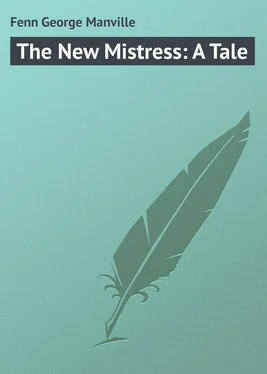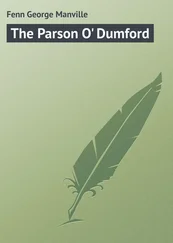George Fenn - The New Mistress - A Tale
Здесь есть возможность читать онлайн «George Fenn - The New Mistress - A Tale» — ознакомительный отрывок электронной книги совершенно бесплатно, а после прочтения отрывка купить полную версию. В некоторых случаях можно слушать аудио, скачать через торрент в формате fb2 и присутствует краткое содержание. Жанр: foreign_prose, на английском языке. Описание произведения, (предисловие) а так же отзывы посетителей доступны на портале библиотеки ЛибКат.
- Название:The New Mistress: A Tale
- Автор:
- Жанр:
- Год:неизвестен
- ISBN:нет данных
- Рейтинг книги:5 / 5. Голосов: 1
-
Избранное:Добавить в избранное
- Отзывы:
-
Ваша оценка:
- 100
- 1
- 2
- 3
- 4
- 5
The New Mistress: A Tale: краткое содержание, описание и аннотация
Предлагаем к чтению аннотацию, описание, краткое содержание или предисловие (зависит от того, что написал сам автор книги «The New Mistress: A Tale»). Если вы не нашли необходимую информацию о книге — напишите в комментариях, мы постараемся отыскать её.
The New Mistress: A Tale — читать онлайн ознакомительный отрывок
Ниже представлен текст книги, разбитый по страницам. Система сохранения места последней прочитанной страницы, позволяет с удобством читать онлайн бесплатно книгу «The New Mistress: A Tale», без необходимости каждый раз заново искать на чём Вы остановились. Поставьте закладку, и сможете в любой момент перейти на страницу, на которой закончили чтение.
Интервал:
Закладка:
Hazel stood waiting for him to turn round, but the Reverend Henry Lambent remained gazing at the water-pipe for some few moments before coughing slightly to clear his throat. Then, in a voice full of haughty condescension, he began:
“I am glad to find that you arrived punctually. Miss Thorne, in accordance with the arrangements that were made; and I take this opportunity of saying a few words to you at this commencement of your career in Plumton.”
Here he stopped, and faced slowly round, allowing his half-closed eyes to rest indifferently upon the new mistress, who was standing facing the window, and upon whose rather pale care-worn face the light fell strongly as he turned.
Very plainly dressed in her well-fitting mourning, Hazel Thorne was one who could have claimed a second look from the sternest of mortals.
It was not that she was surpassing beautiful, and could boast of finely-chiselled nostrils, Juno-like brow, or any of the wonderfully entrancing features with which some novelists endow their heroines; Hazel was simply a sweet-faced, thoroughly English girl, but there was an expression in her eyes, a touching look so full of appeal that it even affected the cold, unimpassioned vicar, who remained silent for some moments as if wondering, and then hastily said:
“I beg your pardon. Miss Thorne, will you sit down!”
He placed a chair for her, and drew another forward from where it was half hidden behind the folds of the surplice but lately hung upon its proper peg, and, astonished at himself waited till Hazel had seated herself before following suit.
“That young man” seemed to have vanished from his thoughts, and the lecture he had intended to read the young schoolmistress upon the bad appearance of such meetings as those which had taken place that morning dropped from his memory, and his lips formed words that surprised him as much as his acts.
“I trust that you have found everything correct at – at the schoolhouse, Miss Thorne?”
“Quite, I thank you,” replied Hazel, with quiet dignity, and she entirely forgot that she was addressing her superior, and left out the “sir.”
“Of course everything is very strange and new to you at first; but er – er, you will soon feel quite at home with us, I hope.”
“Indeed, I hope so,” said Hazel earnestly. “The time has been so short as yet.”
“Yes – of course – so very short,” replied the vicar. “My sisters will call to-morrow, I have no doubt and see Mrs Thorne. I shall be down at the school in the afternoon. You saw Miss Burge, of course, this morning?”
“Oh yes. Miss Burge walked up to church with me.”
“And Mr William Forth Burge too, if I mistake not. Most admirable people, Miss Thorne. Great patrons of our schools. I trust that you will – er – er – try to – er – that is, endeavour to meet them in little matters, connected with the management of the children.”
“You may rely upon my trying to thoroughly fulfil my duties, Mr Lambent,” said Hazel quietly.
“Of course – to be sure, Miss Thorne, no doubt,” he said hastily; and as he spoke he wondered at himself more and more; “but I must not detain you, Miss Thorne. Er – allow me one moment, the curtain is rather awkward to one unaccustomed to the place.”
And, to the astonishment – the utter astonishment – of his sisters, who were standing as stiffly in the chancel as if they were a couple of monumental effigies, the Reverend Henry Lambent opened the door, passed out first, and then stood holding the curtain aside for Hazel to pass, which she did, bowing gravely and with quiet dignity to the two ladies before gliding along the nave and out of the door.
Neither of the sisters spoke, but stood, like the vicar, watching the new mistress leave the church.
At last Miss Beatrice turned.
“What excuse did she make, Henry?” she said.
“I – er – I beg your pardon, Beatrice?”
“I say, what excuse did she make? Really, her conduct is very, strange.”
“Excuse? Oh, of course, about her visitor,” said the vicar absently. “I er – I – on second consideration thought it would be better to ignore the matter. Perhaps she was not to blame.”
“Henry!”
“Beatrice, my dear,” said the vicar quietly, “I always abstain from having refreshments in the vestry, but the morning service is long and I feel faint. Let us go home to lunch.”
Miss Beatrice had the first rule over the vicarage, her elder sister the second rule, and generally speaking, the vicar let them have matters entirely their own way; still, there were times when he took the reins in his own hands, and then it was dangerous to interfere.
This was one of the times when the vicar showed that he had a will of his own, and consequently the sisters exchanged glances and said no more.
Chapter Seven.
“What did I see in this Boy?”
Hazel was not destined to reach home without adventure, for before she had gone far she could see Mr Chute walking along very slowly, right at the bottom of the street, and evidently hoping that she would overtake him. But this was not the cause of the palpitation from which Hazel suffered, for, about halfway between the church and the schools, she saw Archibald Graves coming to meet her, walking very fast; and she had to prepare herself for the encounter that was now inevitable.
“At last!” he cried, eagerly, as he came up. “My dear Hazel, I thought I was never to see you.”
She took no notice of the proffered hand, but walked quietly on.
“Won’t you take my arm, Hazel?” he exclaimed. “Oh, don’t be so hard on a fellow. What have I done?”
Hazel turned her large earnest eyes upon him, and seemed to look him through and through, as, instead of answering his question, she put one to herself.
“What did I see in Archibald Graves, this thoughtless boy, who can come and ask me such a question after the agony I have suffered? What did I see in this boy to make me think I loved him with all my heart?”
Poor Hazel! It did not occur to her that a short two years since she was a light-hearted girl; and that since then she had grown into a deep, earnest woman, who had been baptised by sorrow, and who could only share the riches of her love with one who was all that was manly and true, and to whom she could look up with respect, even with reverence; whereas now, with his petulant boyish, injured air, Archibald Graves only filled her with something akin to disgust.
“I say, you know, Hazel,” he went on, “don’t be so hard on a fellow. The governor was dead against my keeping it up, you know, and he wanted me to give him my word not to see you any more; but at last I thought I must see you again, so I found out all about what you were doing, and where you were, and followed you down here; and ’pon my soul, when I saw you leading that string of scrubs of school children to church, I did not know whether to laugh or cry.”
“Then Mr Graves is not aware of your visit down here, Archibald?” said Hazel quietly.
“By Jove, no! he would be in a wax if he knew.”
“Then why did you come?”
“Why did I come? Oh, I say Hazel,” he cried reproachfully, “I didn’t think you could be so hard upon me. You don’t know how I’ve been upset all about it. ’Pon my word, there were times when I felt almost ill.”
“Has he altered?” Hazel’s heart cried out within her, “or have I become worldly and cold, and, as he says, hard?”
“I say, you know, Hazel, you must give up all this wretched business. I shall tell the governor that I mean to keep to our old engagement, and he’ll come round some day; but you must give up the school teaching, as he’d never stand that, for he’s as proud as Lucifer. Come, I say, it’s all right again, isn’t it?”
Читать дальшеИнтервал:
Закладка:
Похожие книги на «The New Mistress: A Tale»
Представляем Вашему вниманию похожие книги на «The New Mistress: A Tale» списком для выбора. Мы отобрали схожую по названию и смыслу литературу в надежде предоставить читателям больше вариантов отыскать новые, интересные, ещё непрочитанные произведения.
Обсуждение, отзывы о книге «The New Mistress: A Tale» и просто собственные мнения читателей. Оставьте ваши комментарии, напишите, что Вы думаете о произведении, его смысле или главных героях. Укажите что конкретно понравилось, а что нет, и почему Вы так считаете.












